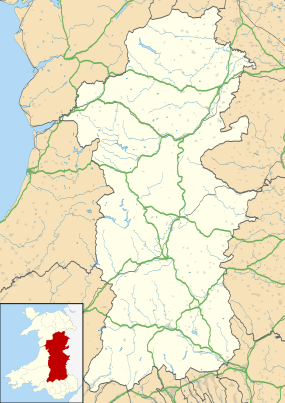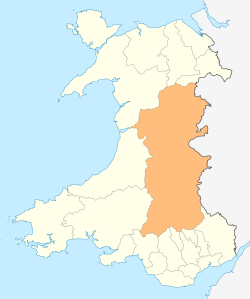Llanwrtyd
| Llanwrtyd | |
|---|---|
| Parish | |
| Ecclesiastical Parish of Llanwrtyd | |
 Llanwrtyd Location in Powys | |
| Coordinates: 52°06′57″N 3°39′43″W / 52.11589°N 3.66193°WCoordinates: 52°06′57″N 3°39′43″W / 52.11589°N 3.66193°W | |
| Country | Wales |
| Local government county | Powys |
| Historic county | Brecknockshire |
| Diocese | Swansea and Brecon |
| Dedication | St David |
| OS grid reference | SN862478 |
| Deposited registers | 1748-1991 |
Llanwrtyd – "Gwrtyd's church"[1] – is a rural parish in Powys, mid-Wales, through which flows the River Irfon.
The parish church of St David dates from the 11th century and is surrounded by scattered farms. During the 19th century the main population centre became Llanwrtyd Wells which grew up around the sulphur springs about a mile and a half down river from the church.
The town is served by Llanwrtyd railway station.
A brief history of Llanwrtyd
Theophilus Jones, in his A History of the County of Brecknock, was fairly disparaging of the parish; when describing the church he states "there is nothing deserving of notice in this miserable fabric, unless it be an inscription on the wall, to the memory of an old woman of the name of Jones."
In 1740 the curate in the parishes of Llanwrtyd, Llanfihangel Abergwesyn and Llanddewi Abergwesyn, was Wales' most famous hymn-writer William Williams Pantycelyn.[2]
The population in 1801 was about 500 which had risen to 854 by the 1901 census. After the coming of the railway the parish played host to at least 12,000 visitors annually to drink the mineral waters.
The parish of Llanwrtyd was made separate from that of Llangammarch in 1871. The parish church of St David, which now stands next to a bridge that replaced the earlier ford, was restored in 1862. In 1897 the church of St James was built in the village of Llanwrtyd Wells.
